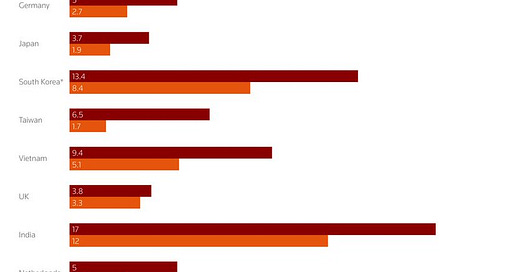I listen to the All-In Podcast. Sometimes, it teaches you something or prompts a question you delve deeper into. Since David Sacks is now the AI/Crypto czar in the White House, the podcast has been adding a guest weekly. This week, it was Naval Ravikant.
The subject of tariffs came up. I abhor them. I am a free trader. I hope the ultimate Trump strategy is to get rid of all tariffs by threatening and increasing US tariffs. The US is the most dynamic economy in the world and everyone wants access to it.
Economically, tariffs are passed on to consumers, who pay them. Tariffs aren’t inflationary the way the Democrats want to say they are. They are big fans of tariffs for pet industries when they are in power. They make industries in your country more inefficient because they don’t have the incentive to compete against more efficient foreign companies.
Naval gave a great economics lesson on tariffs. When I was in France last November, you saw the effect tariffs had on things like wine. France allows very little importation of wine and vigorously subsidizes and protects its wine industry. It’s one of the reasons French wine is expensive.
This chart is interesting because it graphically shows tariffs. The rest of the world does not seem to be embracing free trade.
Enough of that.
Naval made a great point on tariffs. They might be necessary for certain industries because it is in the US strategic interest to encourage and have that industry here. His example was drone technology. Drone supply chains and tech are mainly based in China. Drones are essential in the next war we decide to fight. Ukraine has used them against Russia and they have worked well.
The US has no supply chain or building capabilities to create them cheaply and quickly.
Naval also made the point that today’s large companies have network effects embedded into them. If a company can utilize network effects, they can eliminate competition and make it impossible to compete. Facebook is a good example. But, there are network effects in durable goods companies too. Tesla might be a good example of that. The car gets better the more they sell because the underlying software in all Teslas gets better the more people drive them.
China is mass producing, subsidizing, and refusing to let other countries compete within its borders in many industries. They are creating network effects inside those industries and exporting. Once they dominate, they can act like a monopolist. They will make it impossible to compete.
Putting up strict import regulations and tariffs to protect against that might be a good idea since many of those industries have defense implications.





I should have added, I am not necessarily persuaded to be PRO tariffs because of this argument but I see the point.
Find it comical that Trump's support of tariffs has turned every Leftist nitwit into a Cato Institute level free-trade advocate. Same people have never met a tax or crony deal that they didn't support, but now that Trump agrees with them, they take the opposite track.
About 90% of it is the Left not getting cut it on the cronyism that tariffs enable. I am not convinced that Trump's tariffs are well advised, but neither are EU tariffs or Canadian tariffs.